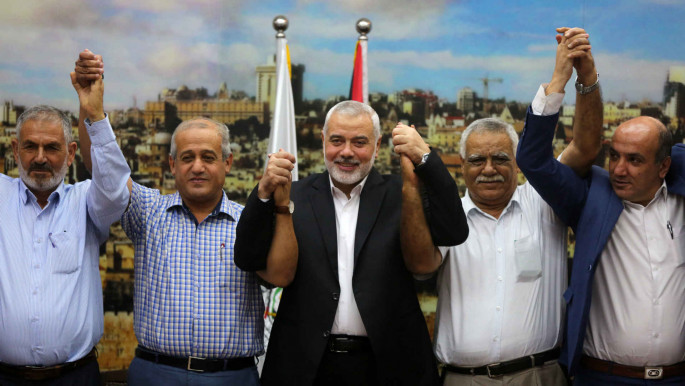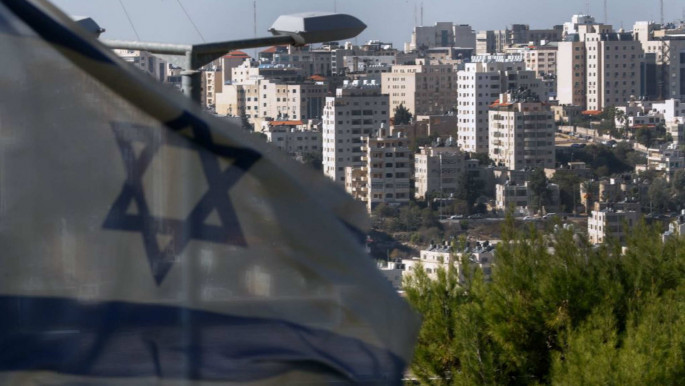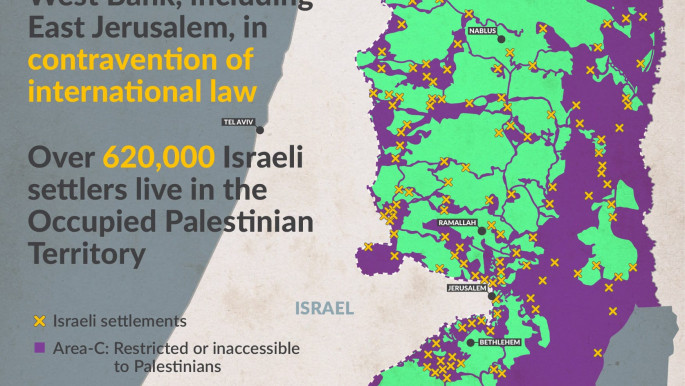Facing years of repression, Palestinians continue to flee Gaza
Palestinians in Gaza have been living under a blockade since 2007, and with fifty percent of the population under 18, many in the Gaza Strip have grown up with a memory only of Hamas rule and war with Israel.
After a shock victory in the 2006 elections, and after a failed coup attempt by their rival party Fatah – who currently control the West Bank through the Palestinian Authority – Hamas took control of the Gaza Strip.
While security and corruption was said to improve, Palestinians felt freedom of expression had been stifled and political freedoms curtailed.
Earlier this year, some discontent with Hamas was briefly shown in protests carried out in the Strip under the banner "We Want To Live". But like other movements against the group, they were quickly put down, with the Independent Commission for Human Rights in Palestine estimating that 1,000 people were arbitrarily arrested during the movement.
Over the years the discontent with Hamas coupled with living with the effects of the Israel blockade has led many young Gazans, many of them descendents of refugees from the 1948 establishment of Israel, to leave the Palestinian territories.
Crackdowns
 |
|
| Read also: Is a national election possible in Palestine in light of Fatah and Hamas rivalry? |
Majid Antar, a 24-year-old rapper, feels that the lack of freedom of expression in the Gaza Strip is hindering his work which is why he decided to travel to Turkey.
"Hamas closed many important cultural centres and institutes like Sharek in 2010, Gallery cafe in 2013 and the French centre in 2014," Majid said, referring to places which have also hosted gatherings of young activists in Gaza.
The closure of the Sharek centre created a March 15th movement in 2011, where young activists organised protests against Hamas, campaigning for reconciliation with Fatah as part of their own "Arab Spring". However, many were arrested. Subsequently they left Gaza, many travelling and claiming asylum in Europe.
"Life with no art and cultural events is so poor, and we as artists become jobless and have no ways to improve our art," Majid said.
"The economy is so bad for everyone... there are many guys here with no work who just spend all day walking on the beach. Of course I want to leave Gaza, I don't have a normal life here. I want to find myself and make music as I want to do. "
Many other young Palestinians felt restricted by the poor conditions in the Gaza Strip such as Sara, who left Gaza and is currently in Turkey. She was shocked by the situation in the Gaza Strip, after returning to the Strip with her family in 2012 after living in the UAE.
"I was a young girl, but the time I spent in Gaza was so bad. Life was not good and everyone is still facing a bad time with every single aspect of life. For me and my family we had a bad situation with money while we were there, a situation we never faced in the UAE - no jobs, a bad economy, and all the power is with Hamas and their people," she said.
"There is no freedom of speech, no freedom of movement in or out of Gaza and no personal freedom. Basically no life!"
When Hamas initially took power in the Gaza Strip, some had hoped that they might tackle the corruption of Fatah and improve the security situation where the Palestinian Authority lacked legitimacy and struggled to control the blockaded enclave. However, some now feel nostalgia for Gaza pre-2007.
 |
Life under Hamas rule has come with worsening economic and political conditions, and has had a direct impact on all aspects of life in the Gaza Strip |  |
"People said that we had no siege. We were able to travel easily, we had no wars like the ones we have after Hamas, it was fine to find a job, it was much easier for people to do what they want, art music and theatre was much much better than now, and there were not many poor people in Gaza like there are now," Sara said.
The wars fought between Hamas and the Israeli military further worsened the dire conditions in the coastal Strip.
"I was there during the 2012 war, I was scared as it was my first time seeing all this. In 2014 during the war, Israelis destroyed a part of our house, and I got injured," Sara said.
"I don't remember any good time in Gaza, except meeting other victims and sharing our suffering."
Amer Balousha is a human rights lawyer and journalist living in Cairo, who is also a critic of the movement.
"Life under Hamas rule has come with worsening economic and political conditions, and has had a direct impact on all aspects of life in the Gaza Strip," he said.
"We the people of Gaza, have been robbed of our future and aspirations as a result of these measures taken against the Palestinian people, whether from the Israeli occupation or from the political mismanagement carried out by Hamas inside the Gaza Strip.
"We have suffered for many years from the erosion of public freedoms in the Gaza Strip because of the actions of Hamas that stifled freedoms in several areas," he said.
"We noticed political arrests in large numbers and we have noticed the repression of all dissidents, the political division and the siege and the attempt to bring down the Palestinian people in the Gaza Strip."
Balousha holds Hamas responsible, although he said there were previously also problems under Fatah.
"Political arrests and the suppression of freedoms existed, but not to the extent is has done under Hamas, and it did not reach the Palestinian people as it has under Hamas," he said.
 |
|
| Read also: Deluded US support for Israeli settlements is a final wakeup call to the EU |
Like many Palestinians in the Gaza, Balousha feels there isn't hope for the movement succeeding, because "Hamas does not consider that the demands of the masses must be met, nor does it allow young people to impose certain internal political demands on Hamas, even from a living or humanitarian side.
"The political movements have faced severe repression from the Hamas security apparatus," he adds. "No youth movement will be able to continue, influence or change things because Hamas rejects any movement that would disagree with its internal rules of government and will face repression and war against it."
Balousha explains that he left Gaza due to the "political arrests" that he frequently experienced, including two after which he had to go to court.
"I resorted to the option of temporarily leaving in order to reduce this intensity and power on activists like me who write their political views," he said.
According to a Human Rights Watch report last year, Hamas security forces often beat opponents arrested in the Strip. It found similar abuses committed by PA forces in the West Bank with security forces across the Palestinian territories "routinely taunting, threatening, beating, and forcing detainees into painful stress positions for hours at a time".
Majid, whose brother left Gaza after being persecuted by Hamas following the March 15th movement, agrees.
"With every protest in Gaza, Hamas sent people into the demonstrations to beat protesters up," he said.
"As soon as the media is silent, they arrest people in huge numbers and treat them really badly. They destroy any brave person who would think to lead a protest in Gaza, and I can see how many guys are left in Gaza after they gave up thinking that they can make any difference or change."
 |
As soon as the media is silent, they arrest people in huge numbers and treat them really badly |  |
Ahmed, who is now in Tunisia, and whose brother left after being arrested multiple times during the March 15th movement, also feels restricted in the Gaza Strip.
"If you want to be open minded, away from religion, see girls, and talk about things, it's not easy – they think you are a dangerous man.
"It became more depressing after my brother left because of Hamas. It was not easy for me to go outside the home, I'm just trying every day to handle this situation, and not to risk my life. Because if you have any problems you can't leave the country – I was being diplomatic and can't leave the country."
"We can't separate conservative society from Hamas – because with my friends and family I can handle these things, but not outside in the society. People are controlled by Hamas, it's not fair to separate them. More religious, more closed."
Ahmed thinks that if there is a future uprising in Gaza, it will not be from Fatah because "there is no water, no electricity, no work, nothing. They are coming out because there is nothing to lose, they are already dead. It's a revolution of hungry people."
Although he does not think such a movement could be successful "because Hamas scare people. Since 2007 people got scared and they knows that Hamas don't think twice if they felt losing control, and they beat with a metal hand as they says, just to protect themselves and to stay in control."
Sara felt threatened by the Hamas crackdowns, even from her new home in Turkey.
"I was in Istanbul during the Bedna Ne'ash movement, I was posting on Facebook like any other citizen, and I thought that no one can stop me from doing that, but they went to my family's house and they asked my father to stop me from posting on Facebook. The last time they threatened him with taking his son instead if they didn't stop me, so I stopped posting," she said.
"I got scared... they can take my brother, no one can stop them. It's not a city that follows the law, they can take anyone, kidnap anyone and they can keep them in jail as long as they want."
Resisting the 'resistance'
An added complication of Palestinians from Gaza who oppose Hamas administration is that the group has portrayed itself as "the resistance" fighting against Israel.
While this meant that in the past, some activists in Gaza were careful to separate between Hamas the administration, and Hamas the "resistance" during war time, others are starting to become increasingly impatient with the group, especially with their stance towards Israel, as conditions in the Strip worsen.
"I don't agree with all Hamas' methods of resistance, especially the marches that happen every Friday where people die and get injured for money that Hamas takes," Majid said, echoing the accusation that Hamas receives funding from Iran by virtue of being a 'resistance' movement.
"I am not a military specialist to know if the resistance we have helps us or not. I see people dying, and we cannot stop Israel from killing more and destroying more houses... but at the same time I believe that we have the right to military power as Palestinians," he said.
Like many Palestinians who oppose Hamas, Amer Balshousha feels that Palestinians have a right to "defence", although feels that it is not helpful.
"In my personal opinion, peaceful resistance must be strengthened in the face of the Israelis who are living on military force and shedding Palestinian blood."
The use of Hamas 'resistance' rhetoric further hinders actions against them, as those who oppose Hamas are portrayed as being sympathetic to Israel.
"The way they are running Gaza is the same cartoonish corrupt way that Fatah run it, but they have resistance on their side, so if you f**k with them you f**k with resistance," said Mohammed, an activist who was involved in actions against Hamas in 2011, and has now claimed asylum in Europe.
"There is a growing frustration with everyone who talks on TV, people would rather deal with Israel than Hamas. An Israeli tank next to the house is better than Hamas deciding life for them. I can't stress this enough, people are waiting for the next confrontation because it will change who is running their lives."
 |
|
The future for Gaza
Despite Hamas' rule, many Palestinians in Gaza do not see a viable alternative in Fatah, who have also been accused of human rights abuses in the West Bank.
"I do not support the rule of Fatah or Hamas. I support the democratic choice and what the Palestinian people choose. Keeping Hamas in power further complicates matters," said Balousha.
"I have a desire, not an expectation, which is that I can return to the Gaza Strip to embrace Palestinian legitimacy with Palestinian reconciliation followed by Palestinian elections in order to produce a consensus to lead the Palestinian people and manage the affairs of the country," he said.
"I hope a settlement is then reached with the Israeli occupation to get a state along the 1967 borders. I cannot be certain of such processes, but this is the agreed vision and the declared position among all Palestinian organisations and this vision that we will fight for."
Majid does not care for the bickering between the factions, or the nature of the negotiations with Israel.
"What a game Fatah and Hamas are playing... I don't support either of them. Everyone thinks that leaving the city is much easier than changing anything here," he said.
"Unfortunately I can't expect any future for Gaza. Nothing is clear... whether there will be an end to Hamas, an end to the siege or an end to the political games."
For Ahmed it was the 2014 war that motivated him to finally leave the Gaza Strip, and he avoided conflict with the administration in Gaza until he was able to leave.
"But after my home was bombed during the war, it changed me a lot. I lost the security and connection with everyone. I want my freedom back," he said.
"I felt like death is coming to this country. The 2014 [war] was something else. I stayed two months after the war, as I lost my cousins, my friends, I lost a lot of things. When you walk the streets you remember everything, the sounds, the pictures. I then needed to leave."
Ahmed hopes for peace in his home country so that he may return to Gaza.
"We already have this history of exile. This is how we live. I agree with a peaceful resolution to save my people, because this is the only way to stop them. This is the only way to stop the blood. I will never shake hands with someone who agrees with the Israeli military and supports it. But I want to stop the war between us, so we can live a normal life, a peaceful life.
"We need this to rebuild our country, to save our identity before we lose it."
Some names have been changed or shortened to protect identity.
Mohammed Antar contributed to this report.





 Follow the Middle East's top stories in English at The New Arab on Google News
Follow the Middle East's top stories in English at The New Arab on Google News


